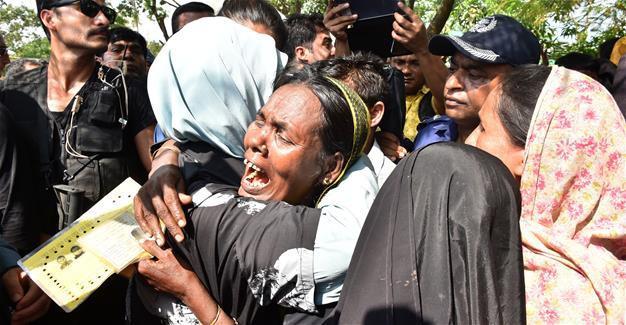UN says 164,000 refugees enter Bangladesh from Myanmar
COX’S BAZAR
 More than 160,000 Rohingya refugees have now crossed into Bangladesh in the last fortnight to escape fighting between militants and Myanmar’s military, the United Nations stated on Sept. 7.
More than 160,000 Rohingya refugees have now crossed into Bangladesh in the last fortnight to escape fighting between militants and Myanmar’s military, the United Nations stated on Sept. 7. The latest estimate by U.N. workers operating there put arrivals in just 13 days at 164,000, up from 146,000 from the day before.
The numbers mean that more than a quarter of a million Rohingya Muslims have fled Myanmar since fighting first broke out last October, plunging neighboring Bangladesh into the middle of a major humanitarian catastrophe.
Myanmar leader Aung San Suu Kyi said on Sept. 7 her government was doing its best to protect everyone in the strife-torn state of Rakhine, but did not refer specifically to the exodus of the minority Rohingya, which was sparked by a military crackdown following a series of deadly raids by Rohingya militants on Aug. 25, but said her administration was trying its best to take care of all citizens.
Western critics have accused Suu Kyi of not speaking out for the Rohingya, some 1.1 million people who have long complained of persecution and are seen by many in Buddhist-majority Myanmar as illegal migrants from Bangladesh.
Some have called for the Nobel Peace Prize she won in 1991 as a champion of democracy to be revoked.
“We have to take care of our citizens, we have to take care of everybody who is in our country, whether or not they are our citizens,” Suu Kyi said in comments to Reuters Television’s Indian partner, Asian News International.
“Of course, our resources are not as complete and adequate as we would like them to be but, still, we try our best and we want to make sure that everyone is entitled to the protection of the law,” she said during a visit by Indian Prime Narendra Modi to Yangon.
Suu Kyi on Sept. 5 blamed “terrorists” for “a huge iceberg of misinformation” on the strife in the northwestern state of Rakhine but made no mention of the Rohingya who have fled.
She has come under increasing pressure from countries with Muslim populations, and this week U.N. Security Council Secretary-General Antonio Guterres warned there was a risk of ethnic cleansing in Myanmar that could destabilise the region.
Myanmar has said it is negotiating with China and Russia to ensure they block any Security Council censure over the crisis.
Suu Kyi said the situation in Rakhine has been difficult for many decades and so it was “a little unreasonable” to expect her administration, which has been in power for 18 months, to have resolved it already.
Rights monitors and Rohingya fleeing to Bangladesh say the Myanmar army has been trying to force them out of Rakhine state with a campaign of arson and killings.
Boatloads of exhausted Rohingya continued to arrive in the Cox’s Bazar region of neighbouring Bangladesh on Sept 7.
U.N. officials in Bangladesh now believe the total number of refugees from Myanmar since Aug. 25 could reach 300,000, said Dipayan Bhattacharyya, who is Bangladesh spokesman for the World Food Programme (WFP).
The surge of refugees - many sick or wounded - has strained the resources of aid agencies and communities already helping hundreds of thousands from previous spasms of violence in Myanmar. Many have no shelter, and aid agencies are racing to provide clean water, sanitation and food.
“Many refugees are stranded in no-man’s land between the border with Myanmar,” medical charity Medecins Sans Frontieres (MSF) said in a statement.
“Even prior to the most recent influx, many Rohingya refugees in Bangladesh lived in unsafe, overcrowded and unhygienic conditions, with little protection from the elements.”
It said more nurses, midwives and doctors had been brought in to tackle violence-related injuries, severely infected wounds and obstetric complications.
















